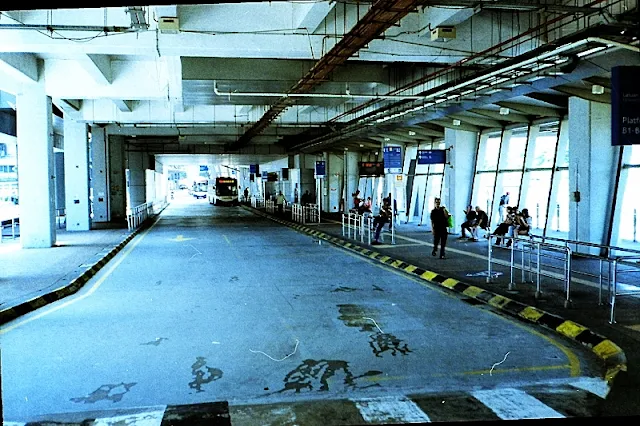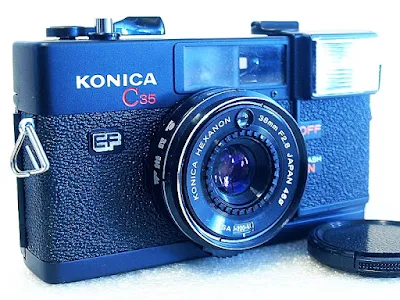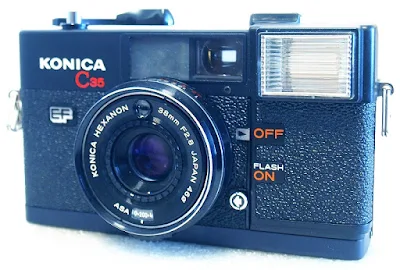Search ImagingPixel for Images by Camera or Lens
Friday, January 17, 2025
Photo of the Day
Thursday, January 16, 2025
Photo of the Day
Vintage Camera Marketplace by ImagingPixel

Wednesday, January 15, 2025
Photo of the Day
Vintage Camera Marketplace by ImagingPixel

Tuesday, January 14, 2025
Photo of the Day
Vintage Camera Marketplace by ImagingPixel

Monday, January 13, 2025
Konica II B, The Street Scene, On A Roll Of Expired Film
While I might have moved completely away from film photography (so it seems), and turned my attention, instead, back to visual storytelling with vintage and legacy lenses, and interest in the resurgence of CCD photography, I do relish the quaint moments and memorable instances I have with the media, especially the fore and the after of the genre. The fore is all about planning and preparing for the shoot, while the after is anticipating the images from the lab, a process workflow almost redundant in the digital era.
In the digital era, while you still need to plan and prepare the groundwork for the shoot, images are instantly ready for viewing and publishing straight-out-of-camera (SOOC) if you wish it to be so, or post-processed with tweaks or other creatives to add to the image done on the desktop.
When it comes to using film for film, or analog photography, enthusiasts have the choice of either using fresh film stock, which is generally more reliable and consistent, or going for the unexpected by using expired film, or film that has surpassed its manufacturer's expiration date. The date, typically indicated on the packaging, is crucial because it marks the period during which the film's chemical components are expected to perform optimally.
Once this date is exceeded, the film, while still usable, will start to degrade, and its characteristics will change significantly with variations in the film's sensitivity, contrast, and color fidelity. This is further accentuated by the individualistic difference between each roll of film used, its age, and how the film was stored.
When using expired film, images will tend to be underexposed. To compensate for the loss of sensitivity, the general rule of thumb is to overexpose the film by one stop for every decade the film has expired. For example, if the expiry date was 20 years ago, set your camera to expose the film at two stops slower than its rated ISO. You can also refrigerate or freeze exposed film if it is not processed immediately after the shoot. Beyond that, there's not much you can do except anticipate the unexpected.
Exposed expired film can be developed like a normal film at your regular lab. You need to inform the lab, though, that the film has expired if you think it might affect the outcome of the process. In terms of cost, while it is generally accepted that expired film is the lower-cost option, using expired film can be more expensive if you are going for a specific or scarce film stock, and having the film developed, beyond the normal, at specialized labs.
The images for this visual were shot with a Konica II B on a roll of expired Fujifilm Superia X-tra 400, a versatile color negative film known for its high speed and excellent image quality. The film stock, a popular choice among both amateur and professional photographers, was discontinued as of April 5, 2024. Post-processing includes exposure tweaks and cropping the images to the 4:5 (for the masthead) and 5:4 image aspect ratios.
The Konica II B, an exquisitely ornate photographic jewelry, is a 35mm rangefinder film camera released by Konica in 1951. The model is part of a series of well-built fixed-lens and leaf-shuttered 35mm rangefinder cameras that started with the Konica (later known as the Konica I or Konica Standard) in 1950 and ended with the Konica IIIM in 1959. The Konica II B, a follow-up to the Konica II, is said to be a lower-priced version of the predecessor and comes fitted with a Konirapid-S shutter and a Konishiroku Hexar 50mm 1:3.5 (from May 1955) or f/2.8 (from June 1955).
Vintage Camera Marketplace by ImagingPixel

Friday, February 9, 2024
Photo of the Day
Vintage Camera Marketplace by ImagingPixel

Thursday, February 8, 2024
Photo of the Day
Vintage Camera Marketplace by ImagingPixel

Wednesday, February 7, 2024
Photo of the Day
Vintage Camera Marketplace by ImagingPixel

Tuesday, February 6, 2024
Photo of the Day
Vintage Camera Marketplace by ImagingPixel

Monday, February 5, 2024
Konica II B, Fujifilm Superia X-tra 400, A Belated Update
Took these images a while back, a real while back, almost a year ago, on a roll of expired Fujifilm Superia X-tra 400, which I did not have the chance to take to the lab for processing until only recently. While these images from the expired film were marvelous, this first outing with the Konica II B was a real test of resilience, as I was still a complete novice with fully manual exposures.
The shoot, though enjoyable, was a real hit-or-miss session where I ended with more under- and over-exposed, and a couple that were out of focus, image frames.
The Konica II B, a model from a well-built series of fixed-lens, leaf-shuttered Konica 35mm rangefinder cameras built from 1950 to 1959, with its extremely acknowledged super bright viewfinder, was a joy to use. It's exquisite, ornate body shape with a curvaceous body panel design that mimics the outline of the hands when the camera is held to the eye.
The camera's body weight is a hefty 681 grams without film, and it does not come with shoulder strap lugs either. Carrying it around is best in its own leather case, or in a makeshift condition, a container pouch of your own.
While I still do relish the moments I spent with a good or an excellent film camera, the ever-increasing cost of film for film photography, and the timeline of its associated services, is the lament that is pushing me more towards the alternative of a new genre to look into.
Digital cameras with CCD sensors that come with no recurring costs or development charges are readily available, with prices for the asking, and may, as some are saying, resurrect themselves as the new film.
Vintage Camera Marketplace by ImagingPixel

Monday, June 1, 2020
An Outing With A Dysfunctional Konica C35 AF
I went on a street shoot, some time back, with a dysfunctional Konica C35 AF, and came back with a whole roll of out-of-focus images, five of which as posted here. The images do show what the Konica Hexanon 38mm F2.8 was acknowledged for.
The C35 AF I was reviewing had, among other things, a dysfunctional AF module, a dead underexposure warning light, and, despite a working flash, a non-working flash-ready light.
A non-manual function that was still working on the camera was the exposure control, which was automatic with the CdS AE system fitted. The shutter works as well, and I can only assume that it does so at one of the three speeds of 1/60, 1/125, or 1/250 second that the camera was specified. The AF camera to subject distance module, indicated by a distance pointer located on the outside of the lens housing mount, after the shot is taken, is not working either.
Regardless, the outing was fun and enjoyable, and the time spent with the camera was full of expectations. The Konica C35 AF, nicknamed 'Jasupin' in Japan, was the world's first production autofocus camera.
The camera was launched in November 1977, a year after the production of the C35 EF ('Pikari'), which itself is a follow-up to the Konica C35 Auto S2, one of the ultimates of the C35 series. The C35 AF has the same Hexanon 38mm F2.8 lens as the others.
Vintage Camera Marketplace by ImagingPixel

Monday, May 18, 2020
Konica Genba Kantoku 28WB, A Street Shoot Look Back
A look back at the set of test images taken with the Konica Genba Kantoku 2WB as used on its film camera review page, as compared to the set used for the initial blog post, in 2019.
An exciting camera with an F3.5 28mm wide-angle lens, the Genba Kantoku (Site Supervisor) is a series of ruggedized and weatherproofed 35mm film cameras first introduced into the construction industry in 1990 as the Genba Kantoku 28.
While the 28mm lens version was also made available as the Konica Off-road Wide 28, and later complemented with the New Genba Kantoku 28, Genba Kantoku 28WB, Genba Kantoku 28WB ECO, and Genba Kantoku 28HG, there was also the 40mm Genba Kantoku, 40mm off-road Genba Kantoku DD, 28-56mm Genba Kantoku Zoom, and later the digital DG-1, DG-2, DG-3Z, DG-4W, and DG-5W.
Vintage Camera Marketplace by ImagingPixel
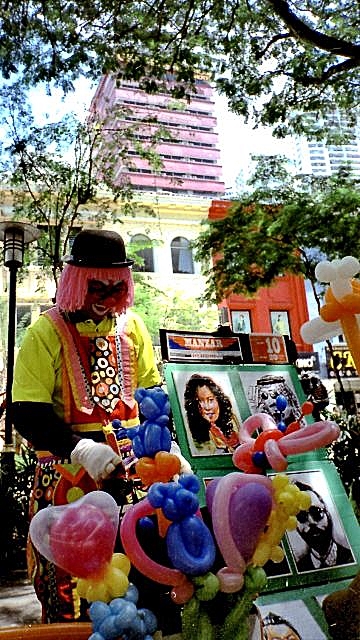
Monday, April 13, 2020
Konica C35 EF, Sights and Scenes III
Last in the series of five images with the Konica C35 EF, one of the cameras mentioned to have a very capable lens and very good shooting habits. The camera, nicknamed 'Pikkari' in Japan, was the world’s first 35mm compact camera with built-in flash, and the first plastic-bodied C35 that was introduced after the earlier Konica C35 series.
The C35 EF is available in two iterations, with the latter incorporating a self-timer located to the left lens at a new speed of 1/250th of a second, added to the 1/60 and 1/125 from the older model, and an orange plastic flash release knob (the old one came with a black plastic one) and the focusing symbols on the lens focusing barrel are framed. Otherwise, the two cameras were mechanically similar.
The C35 EF's light meter requires a 1.3V PX675 mercury battery. As a replacement, a 1.5V button cell should work almost as well. Flash requires two AA alkaline batteries, while NiMh rechargeable batteries are not advised.
Vintage Camera Marketplace by ImagingPixel

Monday, March 23, 2020
Konica C35 EF, Sights and Scenes II
The second set of images, after Part I, on my walkabout in the city with the Konica C35 EF. Nicknamed 'Pikkari' for being the first 35mm compact camera that came with a built-in flash, the camera was introduced in 1975. Name-wise, the C stands for 'compact', the 35 for 35mm film, and EF for 'electronic flash'. Focusing is enabled by selecting preset distances on the rotating lens barrel, using the zone focus method.
One regret of the camera over its predecessor, the C35 Automatic, is that the camera is not a rangefinder anymore. It is now a zone-focusing model, with a four-zone setting dial located on the rotating lens barrel. The camera, as dictated by its development, is available in two iterations, one from its release date in 1975 and the second from 1977 onwards.
The difference between the two models is the addition of a self-timer and a new speed of 1/250 second, which is added to the 1/60 and 1/125 from the older model. On the new model, the self-timer lever is located on the left side of the lens, an orange plastic flash release knob (the old one came with a black plastic one), and the focusing symbols on the lens focusing barrel are framed, otherwise, they are similar.
Vintage Camera Marketplace by ImagingPixel
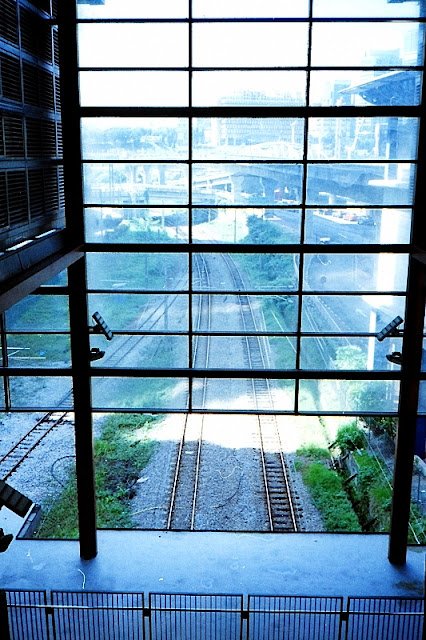
Monday, December 23, 2019
Konica C35 EF, Sights and Scenes I
One of my favorite film cameras, to date, is the small and compact Konica C35 Automatic, a true rangefinder and a favorite with a tack-sharp four-element Hexanon 38mm F2.8 lens. The camera was part of a four-camera series by Konica, which includes the original C35, C35 V (C35 E&L), C35 Automatic (C35 Flashmatic), and Auto S3 (C35FD).
The follow-up series, which started with the Konica C35 EF, nicknamed 'Pikkari' in Japan, introduced in 1975, was the first 35mm compact camera with a built-in flash. Over the original series, the C35 EF was an all-black plastic body and, much like the earlier C35 V, comes with only a zone focusing feature.
The camera itself is slightly bigger and wider than the original C35, and as I can see from the ads listed on auction sites, it will be a hard sell if you find one that is fully functional. Mine had a non-working flash. You still need a battery to run its AE electronics. I had a 1.5-volt SR44 installed, which should work just as well. At a pinch, you may want to set the film ISO speed to a lower setting to cater to the difference.
Vintage Camera Marketplace by ImagingPixel

Popular on ImagingPixel
-
Analog Diary: Film photography favorites, image making with a Fuji K-28, a manual distance focus, shock and weather-proof 35mm film ca...
-
01/18/2017, Olympus Pen FT, F.Zuiko 38mm F1.8 An idea book for the pandemic stay-at-home confinement, a date-timed, annotated thema...
-
CCD Resurgence: A new set of impressions with the Nikon D200 and a newly re-acquired copy of the Sigma Zoom-γ 21-35mm f/3.5-4. ...
-
Compact Comeback: A quick look at image making with a vintage compact, the Olympus VR-370, held vertically to shoot in the half-fram...
-
CCD Resurgence: Image making with a legacy Nikon Nikkor Ai 28mm f/3.5 on an equally vintage 10MP CCD Nikon D200 AOS-C digital SLR ca...
-
Digital Moments : A look at vintage primes and legacy lenses equivalent to the standard normal primes on 4/3 mirrorless or APS-C dig...
-
Digital Moments: A quick look at a highly recommended legacy prime well worth its keep value and usability on modern digital cameras...
-
Olympus Pen E-P5, Olympus Zuiko MC 21mm f/3.5 << Click on image for enlarged Lightbox display >> ...
-
Olympus VR-370 << Click on image for enlarged Lightbox display >> Vintage Camera Marketp...
-
Olympus VR-370 << Click on image for enlarged Lightbox display >> Vintage Camera Marketp...









































